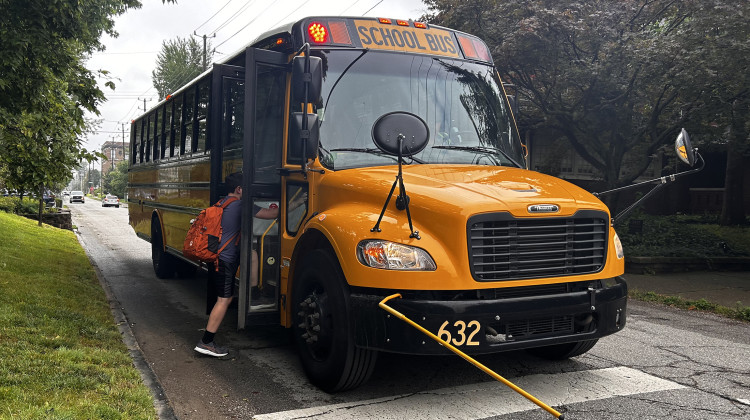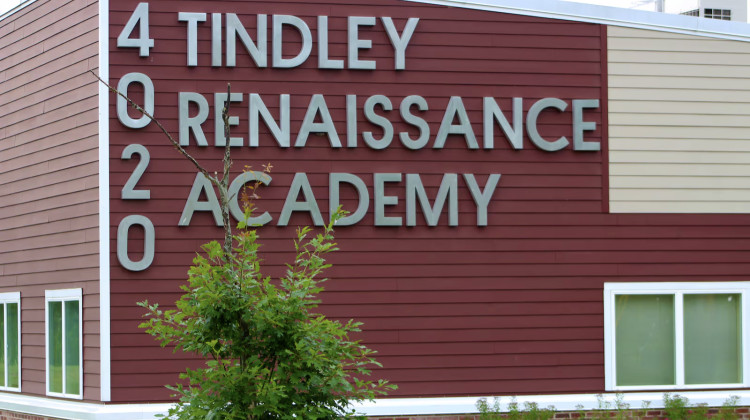INDIANAPOLIS – A Trine University board will shut down the online-only school it chartered three years ago due to management and academic problems, leaving more than 1,100 Hoosier students from across Indiana to find a new place to attend classes.
The parents of Indiana Cyber Charter School students were notified Wednesday that the school will close June 30.
The school and Trine’s Education One – the university’s nonprofit board that oversees charter authorizations and revocations – are implementing a transition plan meant to help families understand their options, which include transferring to traditional public schools or other charters.
“In the coming weeks we will be reaching out to the families with our transition plan, to help make the process more smooth” said Lindsay Omlor, the managing director of Education One.
In addition, the Education One board has voted to close the Indiana Achievement Academy in Indianapolis, which has served 84 students in its first year. The school, which uses a combination of online and onsite instruction, also has had some financial and management issues, Omlor said.
Charter schools are publicly funded schools that operate largely outside a traditional district structure. They must be “chartered” by an organization – which can include some mayors, public and private universities, and a state board – that have been authorized in state law.
Trine University created Education One to be its chartering organization.
The Indiana Cyber closure comes less than two years after Trine officials boasted that its test results ranked it among the Top 10 charter schools in the state.
Enrollment ballooned over the next two years – from less than 100 in the first year to about 235 in 2013 and then more than quadrupled to about 1,100 in 2014. At the same time, the school parted ways with its curriculum partner and financial problems began to emerge, Omlor said.
Meanwhile, academic achievement plummeted. During the 2012-2013 school year, 72 percent of Indiana Cyber students passed both the math and language arts sections of the ISTEP exam. In 2013-2014, the passing rate dropped to 54 percent. Results are not yet available for the 2014-2015 school year.
In addition, some of the school’s vendors had not been paid causing parents to complain to Education One that online services and the help desk were sometimes unavailable – which Omlor said are absolute necessities for a virtual school that uses a largely self-directed model.
Omlor came to Education One last summer and the board assigned her with launching examinations of all the schools it had chartered. She zeroed in on problems with Indiana Cyber, in part out of concern that its split with a partner – Pennsylvania-based National Network of Digital Schools – had left it on the hook for some $600,000.
Don Williams, then the CEO of Indiana Cyber, assured her and the school’s board members last fall that the financial picture would clear once the state distributed a $750,000 tuition allotment in November and again in December.
It was a pattern of questions and reassurances that would repeat over several months as Education One officials raised concerns about debt and financing and Williams would provide documentation indicating the school was on a path to recovery, Omlor said. At one point, the Education One board notified Indiana Cyber it wouldn’t renew its charter but a review panel recommended a continued partnership – under probationary terms that included new accountability and a revamped board.
But problems persisted, Omlor said. During the first few months of 2015, a new board president resigned, as did a school business manager, reportedly saying she didn’t want to be responsible for signing any more checks. Then a key administrator at the school provided Education One with further documentation of additional financial problems.
In March, the Indiana Cyber board voted to fire Williams as its CEO. And in April, Education One hired an auditor to further investigate problems at the school.
Matt Fabina of Investigation, Inc. interviewed Indiana Cyber vendors, reviewed financial records, and met with the school’s business manager and bankers. In Fabina’s final audit to Education One he reinforced their concerns about the management of public funds, Omlor said.
The audit “showed the school could be viable,” she said. But “it confirmed a lack of transparency about the flow of data” and key financial information.
The final report led Education One to vote to terminate the Indiana Cyber charter.
Meanwhile, Williams was also serving as CEO of Indiana Achievement Academy, something the Education One board saw as a problem. In addition, the Indiana Achievement Academy operated under a three-member board – and all three members resigned within a short amount of time, Omlor said.
“Knowing the connection between the CEO with both entities and similar concerns on a much smaller scale was what drove everyone to vote closure,” Omlor said.
The closure of both schools is effective June 30, which is intended to give the students and their families’ time to finish up the classroom units they are working on.
The affected students have several educational options. They can attend public school, try a brick-and-mortar charter school, or try one of the state’s two other virtual charter schools.
Omlor says she is not sure if those schools are ready to take on a large influx of students but is planning to collaborate with other online schools. “We will not be directing the students to any one school, rather we are showing them their options,” said Education One attorney Heather Willey.
Currently, Education One also oversees Timothy L. Johnson Academy in Fort Wayne and Indiana Life Science Academy in Indianapolis.
“It’s fair to say we are doing our due diligence,” Omlor said when asked if those schools are in good standing.
Education One is planning to charter three schools in South Bend – Career Academy South Bend High School, Career Academy South Bend Middle School and Success Academy South Bend Elementary School.
Michael Bock, an Education One board member and senior vice president of Trine, said the experiences with Indiana Cyber and Indiana Achievement Academy won’t scare the group from chartering another virtual school.
“We were excited about the whole concept of Indiana Cyber,” Bock said. “I think there is a future for this type of option.”
“Initially as we started, we were excited about our progress and their progress and being ranked in the Top 10 right out of the gate demonstrated it was a concept that served a need.”
Max Bomber is a reporter for TheStatehouseFile.com, a news website powered by Franklin College Journalism students.
 DONATE
DONATE








 Support WFYI. We can't do it without you.
Support WFYI. We can't do it without you.